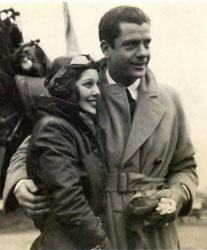Grant Withers
 At the end of summer, 1929, Loretta was cast opposite Grant Withers in a movie titled Second Floor Mystery. Grant was a charming, handsome party boy. He had married and fathered a child before he was 20, and was now 25, divorced and a heavy drinker. But, Withers was also a rising matinee idol and considered by most actresses as a "catch."
At the end of summer, 1929, Loretta was cast opposite Grant Withers in a movie titled Second Floor Mystery. Grant was a charming, handsome party boy. He had married and fathered a child before he was 20, and was now 25, divorced and a heavy drinker. But, Withers was also a rising matinee idol and considered by most actresses as a "catch."
Loretta had already fallen in and out of "love" with former co-stars Douglas Fairbanks, Ronald Coleman, John Barrymore and others. But Grant loved her back — which was certainly a welcome new experience — and immediately began to woo her.
The family was concerned; he was certainly too old and he was not free to marry in the Church. Gladys could only hope that her daughter's current schoolgirl crush would end as abruptly this time as it had on earlier occasions. But, two weeks after Loretta's 17th birthday, on January 26, 1930, the pair eloped.
"Grant told me he would die if I didn't marry him, and I was dumb enough to believe him. So we hired a little airplane to fly to Yuma, Arizona, where we could be married. When we took off, I remember thinking, 'Well, since we're not getting married in the Catholic Church, I'm not really getting married at all.' That was how I justified it that day."
After a civil ceremony, the newlyweds flew home to a storm of publicity. Members of the press were milling around as their plane landed. Then, she saw her stepfather, Mutt, coming toward them, looking stern.
"Gretchen, your mother wants to see you, right now!" Mutt announced, as the press surrounded them. Gladys was waiting at home, as pale as Loretta. She began to cry. "Don't you realize how serious this is?"
"Loretta!" It was Grant calling. "Let's go home." Home wasn't this house anymore, with Mama and her sisters. No, now she was going to live in an apartment with a man, someone she barely knew and already suspected that she didn't love.
It was not only her family, the press seemed disappointed in Loretta too. They felt her wholesome image had been compromised. "You have class," one reporter told her. "This made you look cheap."
Eventually, there was trouble in Paradise. Loretta was working exhausting hours, and tiring of Grant's drinking, gambling and hunting with "the boys" - including his good pal, John Wayne. Romance — at least with Grant — was not all Loretta had expected it to be. "I was playing at being married," she admitted. "As an actress, I sometimes didn't know where play acting ended and reality began."
One day, when Grant was sent away on a tour, Loretta ran home to Mama. "I don't want to be married anymore," she announced. "I'm sorry to have made my mother unhappy and Grant unhappy," she later told reporters.
"That was probably another turning point for me," Loretta recalled. "After that, I never wanted to play evil people in movies, or wear immodest costumes." Her perfectionist tendencies solidified. She would do her absolute best not only in her work, but also in life.
Next: The Star Treatment
Excerpts © copyright 2000 Joan Wester Anderson. All rights reserved.